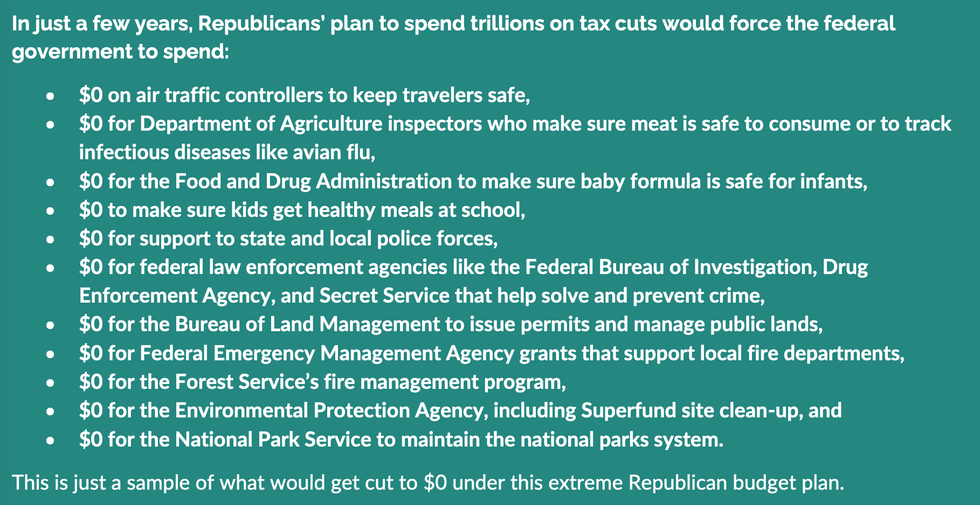Budget proposals released by congressional Republicans in recent months lay bare the party's desire to slash taxes for wealthy Americans and large corporations at the expense of key government programs and services, including nutrition assistance, environmental protection, and Medicaid.
That's according to an analysis released Wednesday by Democrats on the Joint Economic Committee (JEC), which examined budget plans the GOP has released as Congress works to craft and pass government funding bills for the coming fiscal year.
The JEC specifically cites a Fiscal Year 2025 budget proposal published in March by the Republican Study Committee, a panel comprised of three-quarters of the House GOP caucus.
The plan, the JEC Democrats noted Wednesday, "claims to balance the budget by cutting Medicare spending, raising the retirement age for Social Security, capping funding for Medicaid and CHIP, and cutting the rest of non-defense discretionary spending by 31% across the board."
"This would drive up health costs for American families by increasing premiums for [Affordable Care Act] healthcare plans and getting rid of protections for people with pre-existing conditions," the new analysis says. "It would also prohibit Medicare from negotiating down prescription drug costs."
A separate proposal from Republicans on the House Budget Committee claims it would finance "large tax cuts for the wealthy by both slashing key services and assuming that their tax giveaways lead to unrealistic levels of economic growth," the Democratic report says.
"Analyzing this budget with more reasonable economic assumptions instead shows that budget would likely require the government to eliminate most federal services within a decade," the report adds.

Sen. Martin Heinrich (D-N.M.), the chair of the JEC, said in a statement Wednesday that "Republicans' extreme proposals are dangerous for America."
"While Democrats are fighting to invest in families, Republicans would rather protect their billionaire friends at the expense of everyone else," said Heinrich. "Kicking 42 million kids off of health insurance, gutting federal investments in public safety, denying veterans hospital care, and getting rid of [Supplemental Nutrition Assistance Program] benefits that help people afford groceries is unconscionable. Americans deserve better."
The analysis from JEC Democrats comes as Republican nominee Donald Trump attempts to posture as an ally of the working class despite his history of assailing labor protections and backing tax cuts for the rich.
Trump has called for an extension of the tax cuts he signed into law in 2017—changes that overwhelmingly benefited wealthy Americans. An extension of the tax cuts would add $4.6 trillion to the deficit of the next decade, according to the Congressional Budget Office.
The former president's advisers have also reportedly discussed reducing the corporate tax rate from 21% to 15%, a change that would give the largest 100 U.S. companies a tax cut of $48 billion per year.
Trump has floated proposals that are ostensibly geared toward helping working-class Americans, including exempting tips from taxation—a proposal specifically aimed at hospitality workers—and eliminating taxes on Social Security benefits.
But earlier this week, UNITE HERE—a union that represents hospitality workers—endorsed Democratic nominee Kamala Harris over the Republican candidate, warning that "another Trump presidency would mean four chaotic years of defending against his attacks on unions, working people, immigrants, women, and others."
As for Trump's proposal to eliminate taxes on Social Security benefits, an analysis by the Tax Policy Center's Howard Gleckman found that the move would reduce "Social Security and Medicare hospital insurance (HI) revenues by $1.5 trillion over the next decade," harming the programs' finances while providing "little or no benefit" to lower-income households in 2025.
"Less than 1% of the lowest-income households (those making about $33,000 or less, would get any tax cut at all," Gleckman observed. "But about 28% of middle-income households would get a tax cut. Among the top 0.1 percent, about 20 percent of households would get a tax cut."
Gleckman found that "in dollar terms, the biggest winners would be those in the top 0.1% of income, who make nearly $5 million or more."

